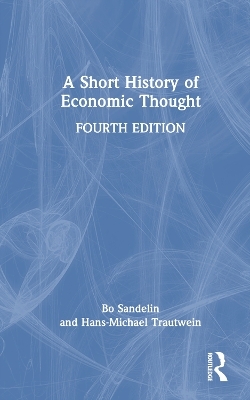
A Short History of Economic Thought
Seiten
2023
|
4th edition
Routledge (Verlag)
978-1-032-51541-0 (ISBN)
Routledge (Verlag)
978-1-032-51541-0 (ISBN)
Now in its fourth edition, A Short History of Economic Thought provides an elementary overview of the history of economic thought.The book has been thoroughly updated throughout in order to reflect changes in the landscape of the field. It continues to be a much-needed text for all introductory economics courses in the field.
Now in its fourth edition, A Short History of Economic Thought provides an elementary overview of the history of economic thought.
This new edition continues to offer its trademark of clear and concise coverage of the main schools of thought and paradigm shifts in the field of mainland Europe, as well as addressing Anglo-American trends. The book has been thoroughly updated throughout in order to reflect changes in the landscape of the field. Details on key thinkers, on early developments outside the Western world, and on the recent evolution of scholarship in quantitative and non-orthodox turns have been added or expanded, while not compromising on the book’s concise approach. A chapter is devoted to each of the major developments in the history of the discipline, concluding with a chapter in which the authors draw together some of the key strands and comment on major works and textbooks in the history of economic ideas. They also reflect on the changes in economic thinking within the general context of the philosophy of science.
This text is ideal for courses where the history of economic thought constitutes only a small part or required background reading. It also continues to be an extremely useful, much-needed text for all introductory economics courses in the field.
Now in its fourth edition, A Short History of Economic Thought provides an elementary overview of the history of economic thought.
This new edition continues to offer its trademark of clear and concise coverage of the main schools of thought and paradigm shifts in the field of mainland Europe, as well as addressing Anglo-American trends. The book has been thoroughly updated throughout in order to reflect changes in the landscape of the field. Details on key thinkers, on early developments outside the Western world, and on the recent evolution of scholarship in quantitative and non-orthodox turns have been added or expanded, while not compromising on the book’s concise approach. A chapter is devoted to each of the major developments in the history of the discipline, concluding with a chapter in which the authors draw together some of the key strands and comment on major works and textbooks in the history of economic ideas. They also reflect on the changes in economic thinking within the general context of the philosophy of science.
This text is ideal for courses where the history of economic thought constitutes only a small part or required background reading. It also continues to be an extremely useful, much-needed text for all introductory economics courses in the field.
Bo Sandelin is Emeritus Professor of Economics at the University of Gothenburg, Sweden. Hans-Michael Trautwein is Professor of International Economics at the University of Oldenburg, Germany.
1. Introduction 2. Pre-classical economic thought 3. Classical political economy 4. Neoclassical economics 5. Historical schools and institutionalism 6. Monetary macroeconomics 7. Orthodoxy and change
| Erscheinungsdatum | 01.09.2023 |
|---|---|
| Zusatzinfo | 3 Tables, black and white; 9 Line drawings, black and white; 9 Illustrations, black and white |
| Verlagsort | London |
| Sprache | englisch |
| Maße | 138 x 216 mm |
| Gewicht | 400 g |
| Themenwelt | Geschichte ► Teilgebiete der Geschichte ► Wirtschaftsgeschichte |
| Sozialwissenschaften ► Politik / Verwaltung ► Politische Theorie | |
| Wirtschaft ► Allgemeines / Lexika | |
| Wirtschaft ► Volkswirtschaftslehre ► Wirtschaftspolitik | |
| ISBN-10 | 1-032-51541-4 / 1032515414 |
| ISBN-13 | 978-1-032-51541-0 / 9781032515410 |
| Zustand | Neuware |
| Informationen gemäß Produktsicherheitsverordnung (GPSR) | |
| Haben Sie eine Frage zum Produkt? |
Mehr entdecken
aus dem Bereich
aus dem Bereich
die Ukraine, Polen und der Irrweg in der russischen Geschichte
Buch | Hardcover (2023)
C.H.Beck (Verlag)
28,00 €
eine Globalgeschichte des Kapitalismus
Buch | Hardcover (2023)
C.H.Beck (Verlag)
38,00 €


